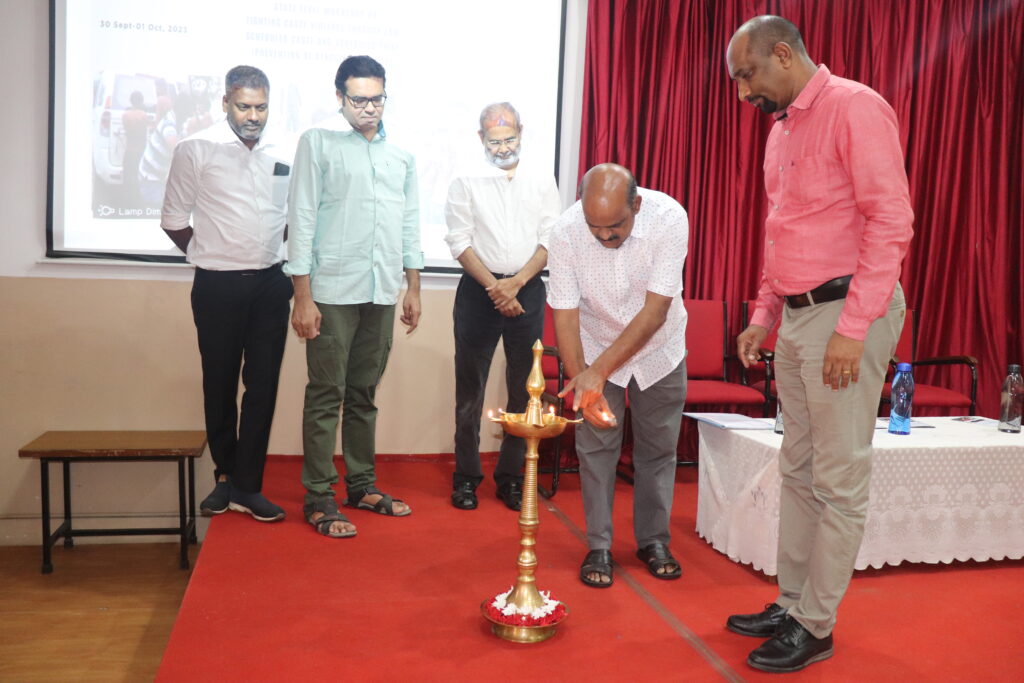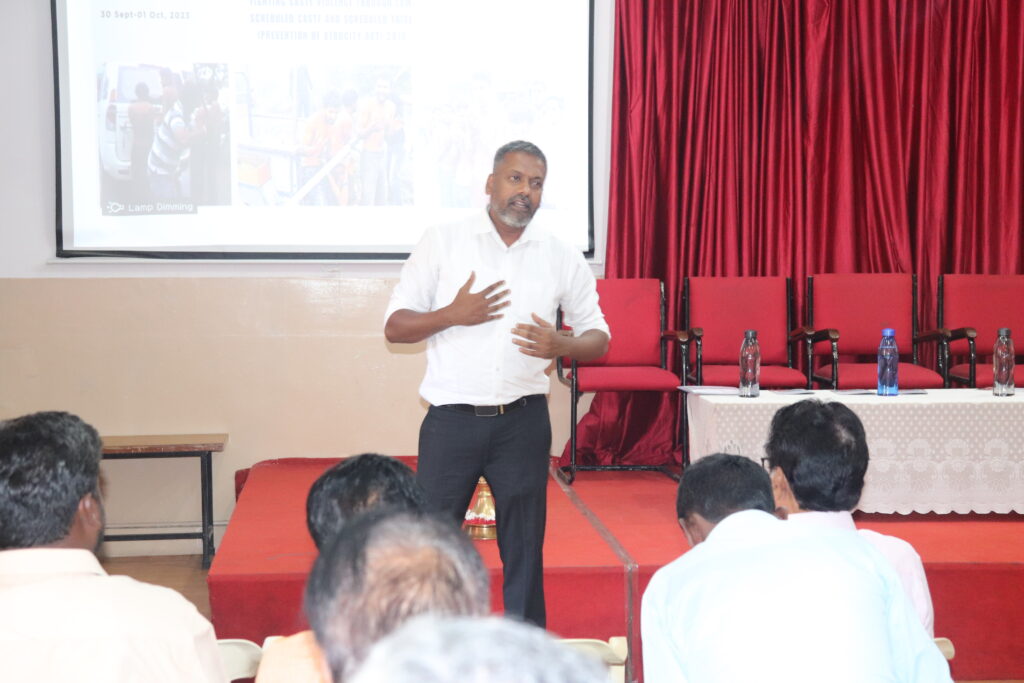


Mr Krishnamurthi from Chikmagluru district, Karnataka said, “I am going with lot of hope. Now I can more courageously address atrocity issues in my place. I will help victim of atrocity to write a strong complaint letter with PoA Act sections included in it”.
Indian Social Institute, Bengaluru organised a two day workshop on SC/ST PoA Act 2015 to about 31 participants i.e, lawyers, social activists, NGOs/CSOs from across Karnataka. The main objective was to bring collectives from different districts of the state to equip them with needed skills in fighting caste atrocity cases. It also meant, building a strong network among the collectives to address atrocities at state level. The chief guest, Sen. Adv. B T Venkatesh from Reachlawer inaugurated the workshop and motivated the participants to give importance to high order of learning and growing in the knowledge of understanding the law in deeper way. He said, it is very important to learn English language to access enormous literature that is available. He concluded by saying, one should be motivated to continuous learning to be effective in what he/she is doing. Then only we will be see the fruit of our hardwork.
Fr Selvaraj Arulnathan SJ, Director, ISIB in his address said, Dr Ambedkar has given us best laws and today we have many other laws and commissions that are to protect people from atrocities. But in reality we see that the atrocities against the dalits and tribals have risen high each year. The dark reality is that they are oppressed and dehumanised in society even in the modern educated society. Unfortunately, political parties are exploiting dalits and tribals for their self-interest or self-gain. It is very important for us to realise that unless we struggle =, we will not be to find justice. We need to assert for our rights all the more today. The right to vote is the valuable weapon and so we must elect those who work for the welfare of marginalised communities.
Senior Advocate Ravi, Special Public Prosecutor (SC/ST Atrocity Cases) Bangalore Urban was very effective in answering to the questions raised by the participants. The participants were very much satisfied to listen the expertise of the special prosecutor and his own experience of fighting atrocity cases. He said, it is not easy to fight atrocity cases in court because poor investigative machinery and delay in trial conviction always deny justice to the victims. Inadequate support systems for victims including the implementation of rights of victims and witnesses under PoA Act remains a challenge. Nevertheless, he said one should not lose hope. One should accept it as a continuous struggle to bring social justice.
Adv Sivamanithan S from Vanguard Law shared his knowledge to the participants on the amendment part of the law. He made case study of Keelvinman (Tamil Nadu), Kambhalapalli (Karnataka), Kairalanji (Maharashtra) and Tsundur (Andhra Pradesh) caste based atrocities. Later, Dr Sidharth K J, Researcher explained on the significance of fact-finding study. He narrated his experience of fact-finding study of a dalit atrocity case of Ms Antoniyamma and her family in Chikmagaluru District in Karnataka. Through fact-finding we can gather facts and witnesses to support the case he said. This will also help in building network among collectives to fight strongly against the powerful and the make the government accountable in delivering justice to the victims.
Speaking on the women atrocities, Adv Manoranjini a senior advocate from Bengaluru said, women become easy victim in atrocities. She gave the case of Kambalapalli, where a dalit family was burnt alive by the upper caste community. And it is very challenging to deal with women atrocities in court. Often, the violence against women are being ridiculed even in courts.
Adv Rahul Singh, from NCDHR & NDMJ, spoke on the strategies for effective implementation of PoA Act 2015. He said, lack of awareness, inadequate training, and biases within law enforcement agencies are the real challenges needs to be addressed. Expressing his concern on non-implementation of Monitoring and Accountability mechanisms, he said that NCDHR has come out with ‘Advisory Guidelines’ which will make the commissions accountable in following due procedures in addressing the atrocity issues.
The participants were given time to share their own experiences of addressing atrocity cases in groups. They also learnt how effectively to write a complaint letter to police on atrocity. A victim shared her own personal experiences of going through brutal violence by the upper caste community in her village in Chikmagaluru district. All were silenced listening to the dehumanising experience of dalit family. The question was raised why it is so hard to find justice for the powerless in society. What is the role government machinery which is suppose to protect the poor. The participants went with much learning in knowledge and skills to address the atrocity cases. They also decided to follow one atrocity case in their own place and also to do a fact-finding of any atrocity case with the support of collectives who attended the workshop.
Fr Francis Balaraj SJ
Social Inclusion & Democracy
